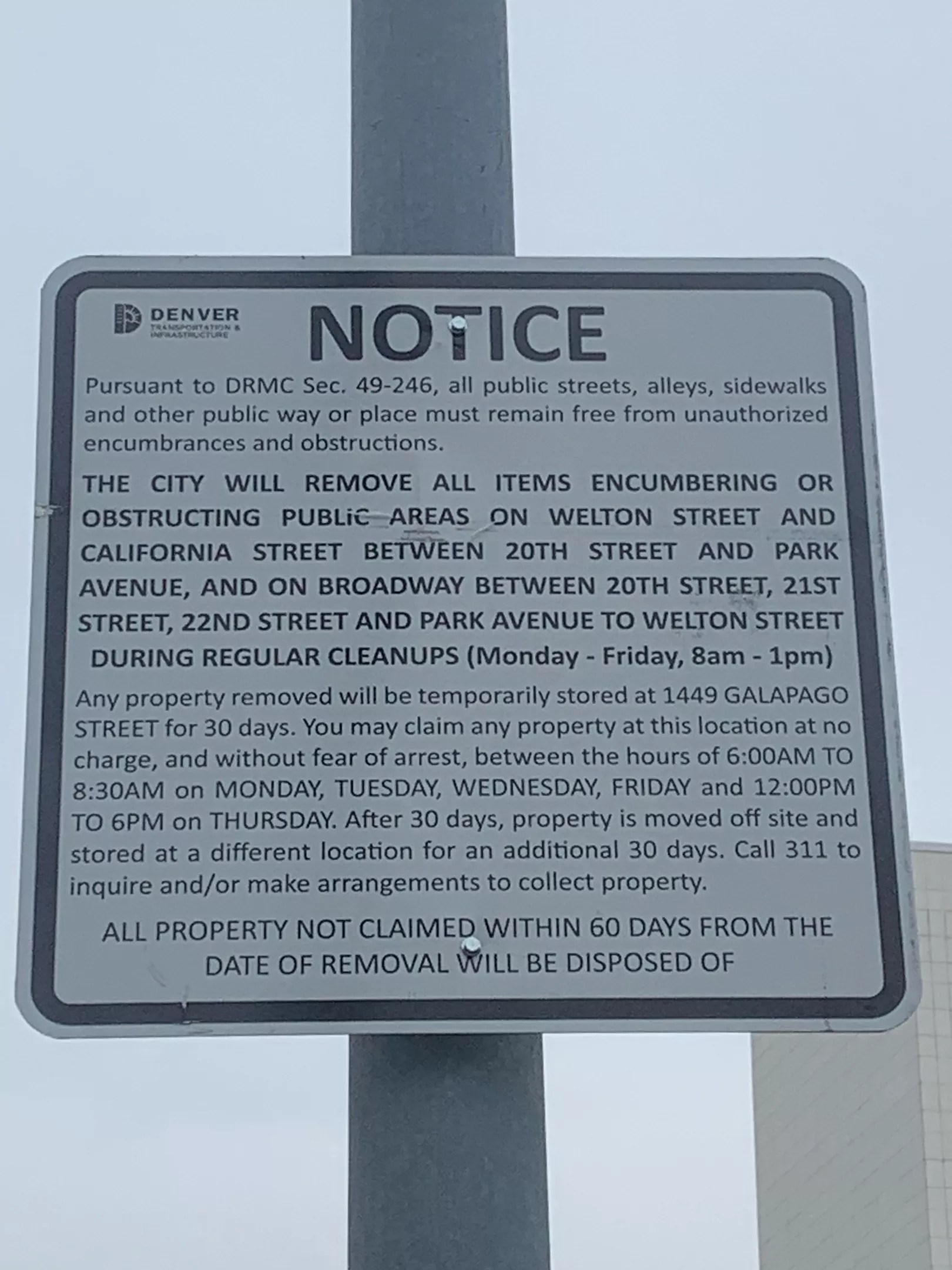
Michael Emery Hecker

Audio By Carbonatix
Under a federal court settlement and a separate federal court order, the City of Denver is required to provide at least a week’s notice when it is planning to sweep a homeless encampment. The notice typically comes in the form of paper signs and handouts given to people who are staying in the encampment.
Now, however, Denver has developed a workaround to providing specific notice each time it plans a sweep in a section of Five Points just northeast of the Central Business District that has become the site of numerous encampments.
In late September, the city decided to set up permanent signage in a multi-block area bounded by Broadway, Park Avenue, Welton Street and 20th Street that announces the city will be conducting “regular cleanups” to remove encumbrances on the public right-of-way. This right-of-way ordinance is one of the primary laws the city cites when justifying an encampment sweep, and it now appears on multiple signs in the downtown/Five Points area.
The sweeps will take place “three times a week or more,” according to Nancy Kuhn, a spokesperson for the Denver Department of Transportation and Infrastructure, “to ensure that the public rights-of-way in this area are clear of trash and items blocking the right-of-way, so that the area may be power washed (when appropriate) and trash left behind in the right-of-way is thrown away. The city has to conduct these cleanups because there are ongoing public health and safety concerns, such as significant and repeated impediments blocking the right-of-way, often making it impossible for the sidewalk to be used by pedestrians creating a dangerous condition where pedestrians are required to walk in the street; the significant and repeated accumulation of trash and rotting food; the significant presence of biohazards, including discarded needles, urine and feces; and the continued presence of dangerous flammable materials such as propane and gasoline.
“We need to create a safe and healthy space for everyone; this regular cleanup area will help achieve that,” Kuhn adds.

The City of Denver has set up permanent signage to notify of sweeps in a section of Five Points.
Conor McCormick-Cavanagh
Councilwoman Candi CdeBaca, who represents the area, says that she had no idea the city was planning to set up the permanent sign. “It’s pretty typical from the mayor,” she notes. “They just kind of run with half-baked ideas all the time and don’t check in with anyone. I’m not surprised by it.”
But she’s pleased that Auditor Tim O’Brien has said that in 2022, his team will look into the cost of sweeps. “I think it’s an incredible waste of money, and I’m thankful that the auditor is going to audit the cost of the sweeps,” CdeBaca says. “To this day, we still don’t know an actual cost to the taxpayer for these sweeps.”
Andy McNulty, the Killmer, Lane and Newman attorney who sued the City of Denver on behalf of Denver Homeless Out Loud and numerous homeless plaintiffs and secured a preliminary injunction in January reiterating the need for a week’s notice, says that he’s reviewing the signage to see if it violates the terms of the order. “I’m trying to see if I need to take some legal action on it,” McNulty adds.
When crafting the preliminary injunction in the DHOL case, U.S. District Court Judge William J. Martinez ruled that the city had to provide a week’s notice for “large-scale encumbrance cleanup[s]” performed by the Department of Transportation and Infrastructure and for any Denver Department of Public Health and Environment-ordered “temporary area restriction of such encampments.”
In explaining the need for the permanent signage, Kuhn notes that regular cleanups can prevent conditions from deteriorating and necessitating a “large-scale encampment cleanup” that would need to be “noticed.”
Local service providers have long decried encampment sweeps as ineffective, saying that they can cut people off from services that they’re just starting to access. And even the Denver Board of Public Health and Environment has issues with the new tactic.
“Our board recognizes that unhealthy conditions can develop in homeless encampments, in response to which DDPHE and other city agencies must take necessary steps to protect the health of the public, including our unhoused neighbors,” board chair Genene Duran wrote in a letter to Mayor Michael Hancock on October 19. “We recognize these actions can have profound effects on the health and well-being of those whose lives are disrupted by such actions. Most importantly, the cleanups also don’t address provision of basic human needs (i.e. adequate access to potable drinking water, toilets and hygiene facilities) or the circumstances that led to establishment of the encampments in the first place.”
The Hancock administration has proposed increasing its financial support of a safe-camping site model, which includes uniform tents set up in a specific area next to centralized sanitation and services. Service providers hope that model will be serving up to 300 people by early 2022. There are an estimated 1,500 people experiencing unsheltered homelessness in Denver right now, but Kuhn says the city’s shelter system still has capacity.